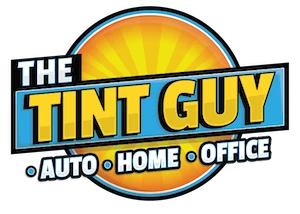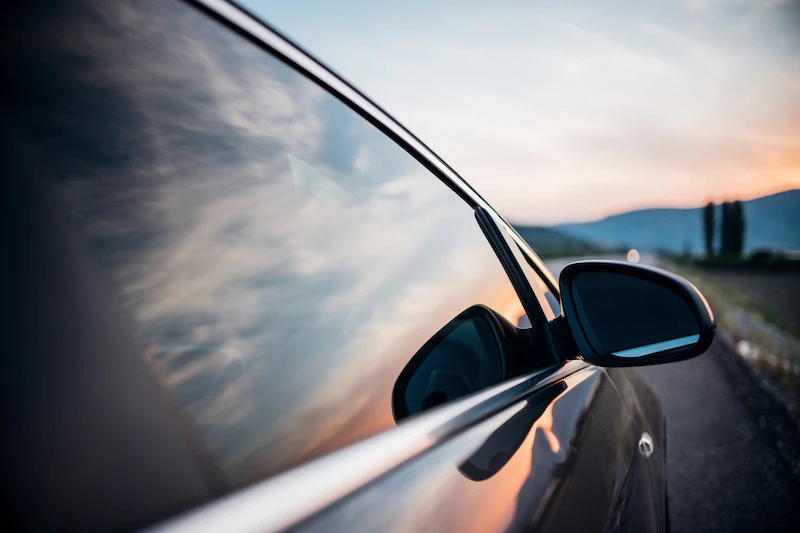The key advantage of window film lies in its adaptability as an aftermarket addition, offering a customizable approach to UV protection and privacy on any existing glass, while tinted glass, though integrated with color or treatments for similar outcomes, lacks the flexibility and cost-efficiency of film, requiring complete glass replacement for installation.
When it comes to window film and automotive tinting, nobody knows it better than The Tint Guy. For over three decades, we have provided the highest quality window films and installation services to countless satisfied customers.
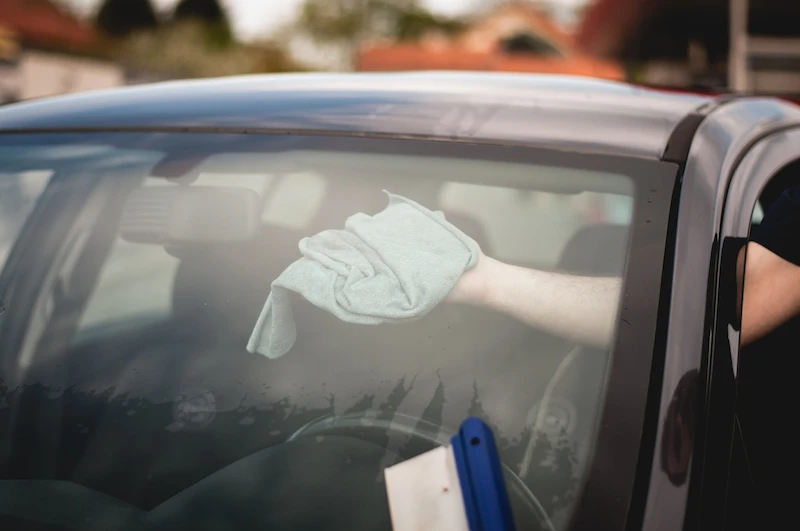
The Basics: Window Film and Factory Tinted Glass
Before considering the pros and cons of each method, it’s essential to understand what window film and factory-tinted glass are in the first place.
Window Film: After Market
Window film is a thin laminate film that can be applied to the interior of glass surfaces in homes, commercial buildings, and vehicles. They are typically made from polyester or other synthetic material due to their clarity, tensile strength, and ability to accept a variety of surface-applied and embedded treatments. Often, these films incorporate several layers to provide everything from UV protection to heat rejection and privacy. Special variants, like ceramic tint, infuse ceramic particles into the film for advanced performance benefits.
Tinted Glass: Original Equipment Manufacturer (OEM)
Factory-tinted glass, also known as privacy glass or factory tint, is glass with pigments and dyes added during the manufacturing process. This gives the glass a darker appearance and helps to reduce the amount of heat and visible light entering through the window. While factory tints can offer a clean, sleek appearance to your motor vehicle, their primary function is generally aesthetic rather than offering superior UV protection or heat rejection.
Application
Additionally, a key differentiator between these two options comes in the form of the film’s application. While window films can be applied to existing windows, factory tint is incorporated during the glass production process. This means choices about factory tinting need to be made during the car manufacturing and purchase process. However, tint shops can apply window film directly over factory-tinted glass for added benefits. To remove factory-tinted glass, you would need to replace the glass itself unlike removing window film where the glass remains intact.
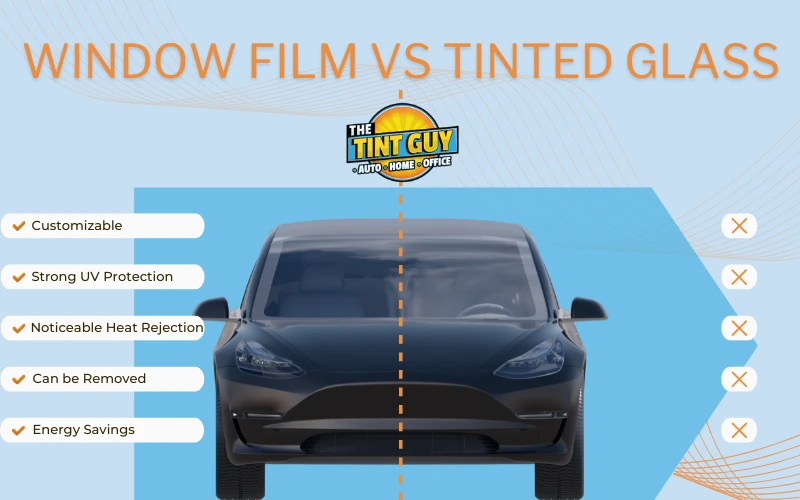
Advantages and Disadvantages of Window Film and Tinted Glass
Window Films Superior Protection
Window films offer numerous benefits. First, they provide effective UV protection by blocking up to 99% of harmful UV rays, making them an ideal choice for your home, car, or commercial building. This UV protection is crucial to preventing skin damage and decreases the fading and aging of furniture, upholstery, and carpets due to sun exposure.
Quality window films provide superior heat rejection capabilities. By preventing solar heat gain, window films maintain a comfortable temperature indoors, resulting in energy savings by reducing the load on your HVAC system.
In terms of adverse aspects, installing window films may require professional help to ensure a flawless finish and maximum effectiveness. Also, while the cost of window films will depend on the type and quality, high-performance options will typically be more expensive than a regular tint, but their long-term benefits can offset this initial cost.
Factory Tinted Glass: Build-In Convenience With Limited Protection
Factory-tinted glass offers the convenience of coming with the car from the manufacturing stage itself. It gives windows a polished, uniform look, preserving the aesthetics of your vehicle.
However, factory tint also comes with some downsides. One significant drawback is its limited UV protection. According to Reuters, investing in factory-tinted glass has “no guarantee that would protect against UV rays.” Also, since factory tint is added during the manufacturing process, it is not customizable, meaning you’re stuck with the window tint that comes with the vehicle.
In summary, tinted glass is mainly used for privacy and aesthetics but has no substantial benefits, unlike an aftermarket tint film that protects against ultraviolet rays. The selection between the two depends greatly on an individual’s specific needs and circumstances. It’s crucial to keep these pros and cons in mind while making your choice.
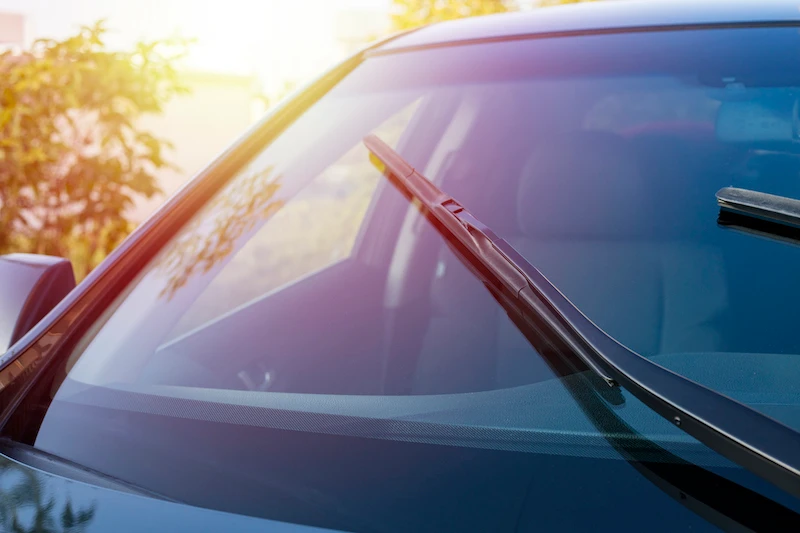
Special Features and Considerations: Recommendations From Experts
There are several special features and considerations to examine. These can help you in deciding which option best suits your specific requirements.
Ceramic Tint
Ceramic tint, a subtype of window film, is a premium choice that incorporates tiny, non-conductive ceramic particles into the film. These ceramic particles dramatically improve the heat rejection capability of the film without reducing visibility, providing you with a cool and comfortable interior without resorting to darker tints. Ceramic tint also stands out for its excellent durability and resistance to glare and fading.
Privacy Window Films
If you value privacy, privacy glass options provide you additional security. These options significantly darken windows, preventing outsiders from seeing into your vehicle. This provides additional privacy for the occupants from the eyes of the outside world.
While factory-tinted glass can offer a sleek aesthetic and some basic benefits when it comes to helpful features window films are the way to go for:
– UV protection
-Heat rejection
-Privacy
-Energy efficiency
Window films outperform factory tints. Experts will recommend window films over factory-tinted glass every time due to the tangible benefits.
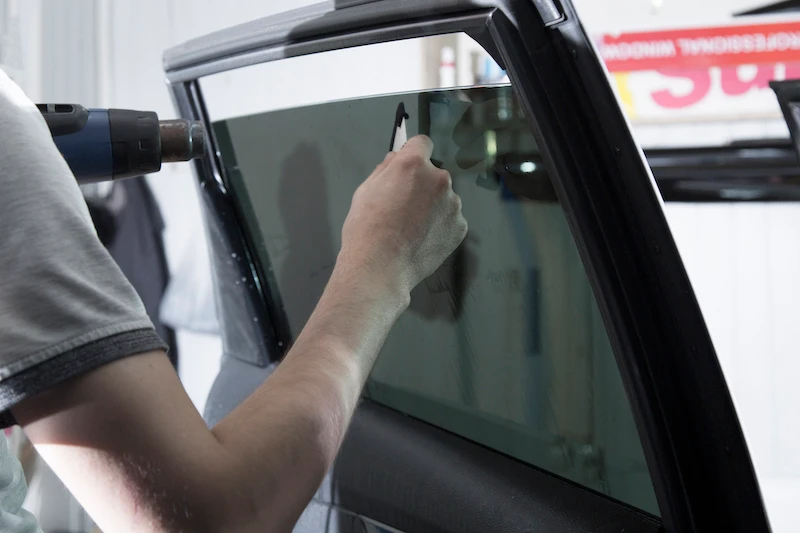
Window Films by The Tint Guy
With a firm grasp of the differences, benefits, and special features of window film and factory-tinted glass, you can make a more informed decision. Your final step? Finding professionals who can deliver exceptional results. That’s where The Tint Guy can help!
Specifically, our automotive window tinting services are unparalleled in the Atlanta area. With the ability to apply high-quality window film to your vehicle’s front windows, rear windows, and side windows, we can significantly enhance your driving comfort, protect you from the harmful effects of UV rays, provide privacy, and boost the aesthetics of your car.
For your homes, our residential window films add a layer of protection to your home against harmful UV rays, extreme weather, and excessive energy usage. We offer Low-E films for energy efficiency that specifically target solar energy and reduce the need for HVAC systems.
For businesses, we offer commercial window tinting services that promise to add privacy and create a more energy-efficient environment, significantly reducing your operating costs.
Don’t hesitate to give us a call to schedule your consultation at our Kennesaw or Woodstock locations. Our team of experts is always ready to guide you through the process, helping you choose the best window film for your needs. Choose The Tint Guy – the most trusted brand name for window tints.
Want more information? Contact our team today for a free quote.
Resources
Car Door Windows Don’t Stop UV Rays | Reuters, www.reuters.com/article/idUSKCN0Y32WH/. Accessed 12 Mar. 2024.
Bain, Julie. “A Surprising Danger in Planes, Trains and Automobiles.” The Skin Cancer Foundation, 6 Dec. 2023, www.skincancer.org/blog/surprising-danger-planes-trains-automobiles/.
“Factory Tint.” Wikipedia, Wikimedia Foundation, 15 Oct. 2023, en.wikipedia.org/wiki/Factory_tint.
